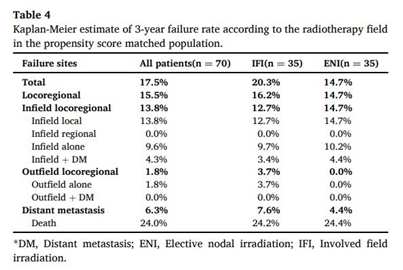글로벌 연구동향
방사선종양학
- [Radiother Oncol .] Definitive radiotherapy in patients with clinical T1N0M0 esophageal squamous cell carcinoma: A multicenter retrospective study (KROG 21-10)
서울의대 / 송준영, 문성호, 김학재*, 김병혁*
- 출처
- Radiother Oncol .
- 등재일
- 2023 Dec:189:109936.
- 저널이슈번호
- 내용
Abstract
Purpose: To assess the failure pattern and analyze the treatment scheme of definitive radiation therapy (RT) for T1N0M0 esophageal squamous cell carcinoma (ESCC).Methods: We performed a multi-institutional retrospective analysis in T1N0M0 ESCC patients who underwent definitive RT from 2010 to 2019. Patterns of failure were demonstrated as in-, and out-field locoregional, and distant metastasis. In the analysis, freedom-from locoregional recurrence (FFLRR) and their association with clinicopathologic factors were evaluated. Propensity score matching in cT1b patients was done.
Results: 168 patients were included with a median follow-up of 34.0 months, and 26 cT1a, 116 cT1b disease. The rates of 3-year all and locoregional recurrence for cT1a were 30.5% and 24.1% and those for cT1b were 27.1% and 25.9%, respectively. Among 116 cT1b patients, 69 patients received elective nodal irradiation (ENI) and 47 received involved field irradiation (IFI). After propensity score matching, the 3-year FFLRR rate was 84.5%. There was no difference between ENI and IFI in FFLRR (P = 0.831) and OS (P = 0.525). The 3-year FFLRR was 83.8% (95% Confidence interval (CI), 61.8-93.8%) in IFI group and 85.3% (95% CI, 65.1-94.3%) in ENI group. In multivariate analysis, concurrent chemotherapy use was marginally associated with FFLRR (Hazard ratio, 0.16; P = 0.064).
Conclusion: cT1a patients who cannot receive endoscopic resection showed similar failure rates as cT1b patients, questioning the staging accuracy and raised the need for thorough treatment like chemoradiotherapy. In cT1b patients, IFI with 50 to 60 Gy and concurrent chemotherapy could be reasonable.

Affiliations
Jun Yeong Song 1, Sung Ho Moon 2, Yang-Gun Suh 3, Jong-Hoon Kim 4, Dongryul Oh 5, Jae Myoung Noh 5, Jae-Uk Jeong 6, Ick Joon Cho 6, Min Kyu Kang 7, Jin Hee Kim 8, Young Suk Kim 9, Hun Jung Kim 10, Woo-Yoon Park 11, Byoung Hyuck Kim 12, Hak Jae Kim 13
1Department of Radiation Oncology, Seoul National University Hospital, Seoul National University, College of Medicine, Seoul, Republic of Korea; Department of Radiation Oncology, Seoul National University, College of Medicine, Seoul, Republic of Korea. Electronic address: ab940121@naver.com.
2Proton Therapy Center, National Cancer Center, Goyang, Republic of Korea. Electronic address: shmoon@ncc.re.kr.
3Proton Therapy Center, National Cancer Center, Goyang, Republic of Korea.
4Department of Radiation Oncology, Asan Medical Center, Seoul, Republic of Korea.
5Department of Radiation Oncology, Samsung Medical Center, Sungkyunkwan University School of Medicine, Seoul, Republic of Korea.
6Department of Radiation Oncology, Chonnam National University Hwasun Hospital, Hwasun, Republic of Korea.
7Department of Radiation Oncology, School of Medicine, Kyungpook National University, Daegu, Republic of Korea.
8Department of Radiation Oncology, Keimyung University Dongsan Medical Center, Daegu, Republic of Korea.
9Department of Radiation Oncology, Jeju National University School of Medicine, Jeju, Republic of Korea.
10Department of Radiation Oncology, Inha University Hospital, Inha University of Medicine, Inchon, Republic of Korea.
11Department of Radiation Oncology, Chungbuk National University College of Medicine, Cheongju, Republic of Korea.
12Department of Radiation Oncology, Seoul National University, College of Medicine, Seoul, Republic of Korea; Department of Radiation Oncology, Seoul Metropolitan Government-Seoul National University Boramae Medical Center, Seoul, Republic of Korea. Electronic address: karlly71@snu.ac.kr.
13Department of Radiation Oncology, Seoul National University Hospital, Seoul National University, College of Medicine, Seoul, Republic of Korea; Department of Radiation Oncology, Seoul National University, College of Medicine, Seoul, Republic of Korea. Electronic address: khjae@snu.ac.kr.
- 키워드
- Esophageal cancer; Failure pattern; Radiation field; Radiotherapy.
- 덧글달기









